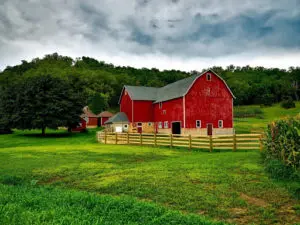Did you know that nearly 40% of all Canadian farmland is rented? This is likely because owning farmland is capital intensive, and renting or leasing farmland frees up capital to invest in equipment and inputs. Leasing and renting are often used interchangeably. Typically however, renting refers to a term of one year or less while leasing is often used where the term is longer than one year.
Leasing farmland is likely a part of every farming operations business plan. For farmland owners and retired or retiring farmers, leasing out farmland often has many benefits such as a retirement income and lifestyle flexibility.
When someone rents farmland, there should be a written agreement in place to protect both the landlord and the renter. This is called a farm land lease agreement and may also come in the form of a crop share agreement The types of farm land lease or crop share agreements vary throughout the province, as do the relationships between landlords and tenants. In this article, we outline some key elements of these leases to help tenants and landlords make sound decisions.
Why is a Farm Land Lease Agreement Important?
Your farm is a big investment, not only financially, but also in time, effort and perhaps even emotionally if it’s a family farm. A well drafted agreement farm lease agreement is important to both the landlord and tenant because it will:
- Clarify the expectations, obligations and responsibilities of both parties
- Possibly prevent costly legal action in the event of a dispute by providing alternatives to a court proceeding
- Gives the landlord some protection in the event of an environmental liability
- Provides a valuable guide to heirs if the landlord or tenant should die
- Provides documentation for tax purposes
Now let’s look at some of the key elements and considerations in the two most common types of farm lease agreements: farmland leases and crop share leases.
Key Elements of a Farm Land Lease Agreement
The details within a farm land lease agreement will vary significantly depending on the type of farm, size of land, environmental considerations, municipal laws and several other factors. The only points of similarity are the required elements of:
- Names and addresses of tenant and landlord
- Description of property to be rented
- Term and renewal of the lease
- Rent payable payment and use of utilities
From that point forward, there are recommended elements to consider. This is where it can be beneficial to work with an agricultural lawyer to ensure the correct elements are worked into the agreement.
The following elements should be discussed with your lawyer and inserted into the agreement:
- Right of inspection and removal of crops: As a landlord, you need the right to inspect the property, and the tenant should be given the opportunity to continue harvesting the crops after a reasonable time period following the termination of the lease agreement or the sale of the property.
- Transfer of property: What will happen if you want to sell the farm? Find a balance between protecting your rights as the owner, while not unduly restricting the tenant’s desire to continue leasing.
- Termination of the lease: Be clear about reasons for termination. This is most commonly due to a breach of something within the lease or due to the time period of the lease expiring.
- Use of the land: Will the land be used to sell pick-your-own-fruit? Will it be used to grow corn? This should be clearly outlined. You should also describe certification, regulatory or contractual constraints that the renter should be aware of, i.e. organic certification.
- Environmental matters: The tenant will be required to adhere to farm practices and legislation relating to the environment (manure disposal, pesticide and herbicide applications, etc.).
- Insurance: Who is responsible to pay insurance - the landlord or the tenant? This should be outlined as well as the type of insurance, i.e. fire, personal injury.
- Rights to assign or sublet the lease: This clause will make it clear that the tenant can’t sublet the property or assign it to another person.
- Resolution of differences: Despite your best efforts to develop a solid farm lease agreement, there may be disputes throughout the relationship. This will outline how those disputes will be handled, i.e. mediation or arbitration.
- Restrictions of land use: If there are areas that cannot be used for farming purposes or are unsafe to access, it should be noted here.
Some optional elements that are often written into the agreement will outline the option to purchase the land after a set term of lease, municipal laws that must be adhered to, who is responsible for management decisions and who is responsible for third-party and environmental damages. Remember that it’s always better to be thorough and prepare for contingencies if you want to avoid potential legal disputes further down the road.
How does a Crop Share Agreement Differ from a Farm Land Lease Agreement?
Crop sharing refers to an arrangement between a landowner and farm operator where the landowner permits a farm operator to plant and harvest crops on the landowner’s lands. In exchange, the landowner and farm operator agree to a certain split of the revenue. Both the landowner and farm operator share the risks and rewards of farming. It also allows the landowner to claim farm income, but may not be sufficient for the landowner to maintain a farming status for the purposes of claiming a capital gains exemption.
When determining the allocation or share of revenues, the following should be considered:
- The local market rates for land
- The negotiating ability of the tenant and landlord
- The expectations of both the tenant and landlord
- The estimated costs and contributions of the tenant and landlord
When in Doubt, Consult a Lerners Agricultural Lawyer
The final best practice that we’ll recommend is to work with an agricultural lawyer to help you determine the crop share contribution and outline a farm land lease agreement that will protect you as the landlord, while ensuring a prosperous experience for the tenant.
At Lerners LLP, our Agricultural Law Group can help clients with all aspects of agricultural law, from sales to leasing to succession planning and wills. For more information, please contact us at: 519-672-4510.
Reference:









